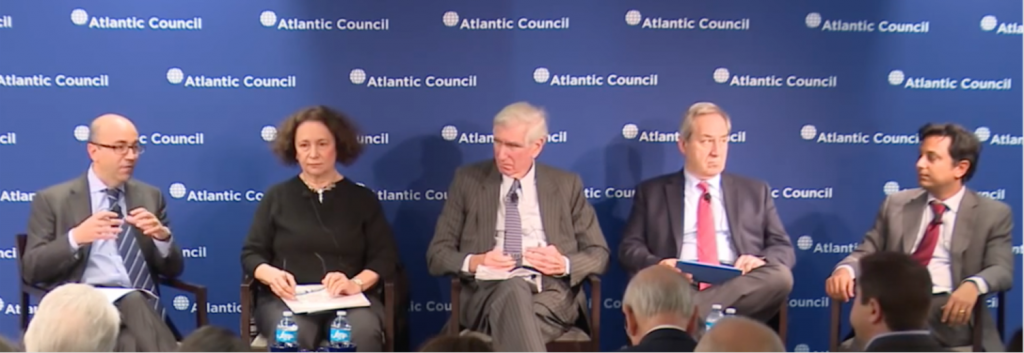In the wake of a new administration, a financial crisis’s, the Brexit and the refugee overflow, the EuroGrowth Initiative has been put together to aid European Development. The Atlantic Council hosted a panel to discuss the next steps in the US-EU relations, taking into consideration the new administration.
Panelists: Ana Palacio (Former Foreign Minister of Spain), Boyden Gray (former US Ambassador to the EU), George Alogoskoufis (former Finance Minister of Greece), Shekhar Aiyar (Deputy Chief, European Department)
Moderator: Andrea Montanino (Atlantic Council)
Because the world is entering a new era of insecurities and challenges, there is a need to foster relationships between the US and the EU. There is a need to see faster economic growth in Europe.
Ana Palacio claims that fostering economic growth in Europe is possible if some issues are challenged and redefined. The former Minister indicates that it is important to build a new initiative for the Energy Union. Further, there is a need to expand the internal markets, as they have stagnated, a change is only possible through delegation. Additionally, there is a need to build the digital agenda as there is no common digital market within the EU apart from roaming. Last but not least it is important to expand security measures.
There needs to be a standard policy and surveillance of the external borders. To boot, Ms. Palacio sustains that there is a need for transparency. She also states that not enough politicians are fighting for the EU and Brussels, but rather they are pinning their problems on the establishment. It is significant to liberalize the free market and to believe in Europe’s future. The former Foreign Minister thinks that there is a common trend of thinking that the US, China, and the UK are more advanced and that Europe is left behind. To conclude she strongly urges no bilateral agreements to be part of talks, as they are irrelevant for the time being, and could push other nations towards ideas of leaving the Union.
Boyden Gray agrees with Ana Palacio that there is a need for internal markets. Further, the former US Ambassador to the EU claims that there is a significant need for deregulation, restructuration, and reformation.
Boyden Gray indicates that the economic ties the EU has with the US are too strong to be taken apart. He illustrates that the new administration will soon understand the extent to which the two economies are intertwined, and it will see it as one. If President Trump is as protectionist as he sustains, then the President will realize how dependent the US is on the European markets.
George Alohoskoufis remarks that the biggest problems in Europe are economic and national populism. He observes that for a free market to be successful, there is no chance for rapid growth. He claims that to fix the problem one needs to look at its roots.
George Alohoskoufis affirms that globalization has brought about significant benefits for societies and economies but that there remain numerous sectors, which have not had access to the benefits. He states that not enough countries shoulder the burden of globalization. The former Minister of Finance illustrates that there is a need for the redistribution of income between the countries which have significantly benefited from globalization and those which have not. For redistribution to be possible, it is necessary to build new initiatives, promote economic integration, create new European programs with a common objective. Further, 1% of GDP is nearly not enough, and at least 3% of GDP devoted to the EU budget is necessary. Last but not least he notes it is important to create a European-wide unemployment program so that the burdens are not held by one country alone. Further Mr. Alohoskoufis maintains that there is a need to be able to measure the EuroGrowth Initiative to determine which areas lack progress.
Shekhar Aiyar sustains that there is a need to underline the economic motivations. That there is a general problem and that productivity is slow, due to the adverse demographics with an aging population that pulls down the structure and level of efficiency. The common currency area should foster quick conversations as it did not speed up the development of the initial 12 adopters, but much rather slowed it down. Convergence happened faster to Germany as the German supply chain receives were primarily affected rather than the members of the Union. These steps have led to persistent imbalances. There is a need for concretive action. Agrees with the other speakers that there is a need for deregulation and market reforms to achieve productivity improvement.
Further, Shekhar implies that there is a need for the EU budget to encourage private investment. There is already planning being put forward although he entails more should be done as it would improve: cross-border investments, the digital market and it would reduce bureaucratic borders. There is a need for loans to be possible through other factions than banks. Europeans get 80% of loans from banks which impediments the system.
For more information visit: http://www.atlanticcouncil.org/events/upcoming-events/detail/european-growth-and-the-next-chapter-in-useu-relations
Synthesis by: Patricia Besciu, all conclusions are those of speakers, no personal opinions have been included.
